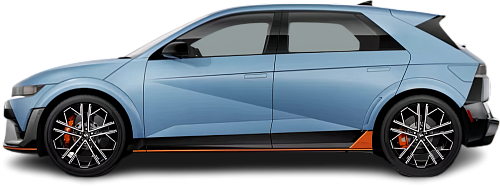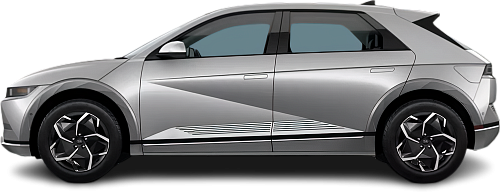USA EV Comparison: Hyundai Ioniq 5 N vs Ioniq 5 Standard Range AWD
Struggling to Decide? Let AI Help!
Your AI Summary Is Ready!
General Info
The Hyundai Ioniq 5 N (2023-…) is currently produced, it has a starting price of $66100. The Hyundai Ioniq 5 Standard Range AWD (2021-2022) has been discontinued, it was never offered for sale in the United States.
The two vehicles share the same body style: SUV.
| Property | Hyundai Ioniq 5 N | Hyundai Ioniq 5 Standard Range AWD |
|---|---|---|
| Years of Production | 2023-… | 2021-2022 |
| Current Status | Produced | Discontinued |
| Country of Manufacture | Indonesia, Singapore, South Korea | Indonesia, Singapore, South Korea |
| Body Style | SUV | SUV |
| Market Availability | EU, USA | EU |
| Price USA (New) | $66100 | - Price USA (New) |
| Price USA (Used) | $52911 | - Price USA (Used) |
| GCC Score | 6.8 | 6.4 |
Range and Efficiency
While the Hyundai Ioniq 5 N (2023-…) offers a longer real-world range and a bigger battery, it is less energy-efficient than the Hyundai Ioniq 5 Standard Range AWD (2021-2022).
| Property | Hyundai Ioniq 5 N | Hyundai Ioniq 5 Standard Range AWD |
|---|---|---|
| Range (EPA) | 221 mi | - Range (EPA) |
| Range (WLTP) | 280 mi | 225 mi |
| Range (GCC) | 224 mi | 191 mi |
| Battery Capacity (Nominal) | 84 kWh | 58 kWh |
| Battery Capacity (Usable) | 80 kWh | 54 kWh |
| Efficiency per 100 mi | 35.7 kWh/100 mi | 28.3 kWh/100 mi |
| Efficiency per kWh | 2.8 mi/kWh | 3.54 mi/kWh |
| Range and Efficiency Score | 4.9 | 5.8 |
Charging
Both vehicles feature an advanced 800-volt architecture.
The Hyundai Ioniq 5 N (2023-…) offers faster charging speeds at DC stations, reaching up to 240 kW, while the Hyundai Ioniq 5 Standard Range AWD (2021-2022) maxes out at 175 kW.
Both vehicles are equipped with the same on-board charger, supporting a maximum AC charging power of 10.9 kW.
| Property | Hyundai Ioniq 5 N | Hyundai Ioniq 5 Standard Range AWD |
|---|---|---|
| Max Charging Power (AC) | 10.9 kW | 10.9 kW |
| Max Charging Power (DC) | 240 kW | 175 kW |
| Architecture | 800 V | 800 V |
| Charge Port | CCS Type 1 | CCS Type 2 |
| Charging Score | 7.9 | 6.9 |
Performance
Both vehicles are all-wheel drive.
The Hyundai Ioniq 5 N (2023-…) boasts greater motor power and accelerates faster from 0 to 60 mph.
| Property | Hyundai Ioniq 5 N | Hyundai Ioniq 5 Standard Range AWD |
|---|---|---|
| Drive Type | AWD | AWD |
| Motor Type | PMSM (front), PMSM (rear) | PMSM (front), PMSM (rear) |
| Motor Power (kW) | 478 kW | 173 kW |
| Motor Power (hp) | 641 hp | 232 hp |
| Motor Torque | 546 lb-ft | 446 lb-ft |
| 0-60 mph | 3.2 s | 5.8 s |
| Top Speed | 162 mph | 115 mph |
| Performance Score | 7.2 | 4.8 |
Dimensions
The Hyundai Ioniq 5 N (2023-…) is wider, but has a similar length and height to the Hyundai Ioniq 5 Standard Range AWD (2021-2022).
Both models have similar wheelbase lengths.
| Property | Hyundai Ioniq 5 N | Hyundai Ioniq 5 Standard Range AWD |
|---|---|---|
| Length | 185.6 in | 182.5 in |
| Width (with Mirrors) | 84.7 in | 84.7 in |
| Width (w/o Mirrors) | 76.4 in | 74.4 in |
| Height | 62.4 in | 63.2 in |
| Wheelbase | 118.1 in | 118.1 in |
Cargo and Towing
The Hyundai Ioniq 5 Standard Range AWD (2021-2022) provides more trunk space, but both cars have an identical maximum cargo capacity with the rear seats folded.
A frunk (front trunk) is available in the Hyundai Ioniq 5 Standard Range AWD (2021-2022), but the Hyundai Ioniq 5 N (2023-…) doesn’t have one.
Neither vehicle is officially rated for towing in the US.
| Property | Hyundai Ioniq 5 N | Hyundai Ioniq 5 Standard Range AWD |
|---|---|---|
| Number of Seats | 5 | 5 |
| Curb Weight | 4861 lb | 4442 lb |
| Cargo Volume (Trunk) | 26.1 ft3 | 26.3 ft3 |
| Cargo Volume (Max) | 58.5 ft3 | 58.5 ft3 |
| Cargo Volume (Frunk) | - Cargo Volume (Frunk) | 0.8 ft3 |
| Towing Capacity | - Towing Capacity | - Towing Capacity |
| Cargo and Towing Score | 6.3 | 6.6 |




